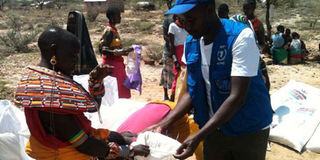Team set up to coordinate relief food distribution

World Food Programme staff distribute relief food to villagers of Losesiai in Samburu on November 24, 2016. A team has been formed to co-ordinate distribution of relief food and water to counties worst hit by drought. PHOTO | GODFREY OUNDOH | NATION MEDIA GROUP
What you need to know:
- Mr Kiunjuri termed the food crisis that has affected at least 23 countries in the Upper region and dry parts of former Western, Nyanza and Central province as “bad, almost critical”, saying the areas had been targeted for distribution of relief food.
- He said the food distribution would target schools to ensure learning was not affected.
A high level team has been formed to co-ordinate distribution of relief food and water to counties worst hit by drought.
Devolution Cabinet Secretary Mwangi Kiunjuri said the committee made up of Council of Governors, development partners and national government officials was meant to quicken the process of identifying hard hit areas for speedy intervention.
The decision was made during a meeting called to discuss the crisis, which the CS termed as critical between the ministry and governors.
At the same time, suggestions to truck water to affected areas were also made. This came as transportation of supplies began yesterday.
“The food for this month has been released and the distribution process has begun and is ongoing. We have also formed a committee to identify pockets of hard hit areas so that they can be prioritised in the distribution process,” he said.
Mr Kiunjuri termed the food crisis that has affected at least 23 countries in the Upper region and dry parts of former Western, Nyanza and Central province as “bad, almost critical”, saying the areas had been targeted for distribution of relief food.
The country is facing one of the worst dry spells following the failure of both the short and long rains, which means that pastoralists lack pastures, farmers in affected areas did not get any harvests, and water has become a scarce commodity, exposing thousands of families and livestock to starvation.
However, Mr Kiunjuri said the government had taken up the challenge and is ensuring that the necessary help is reaching the affected regions.
The CS noted that the relief efforts were being coordinated in three phases, the first one being the immediate phase where Sh5.4 billion had been set aside mostly to distribute food and water.
STARVING KENYANS
The second phase, he said was short term and would cost Sh9 billion. He added that the budget for implementing the final phase— the long-term phase— and the scope of intervention required was yet to be decided.
Speaking in Laikipia over the weekend, the CS urged administrators in the affected regions to ensure no one died of hunger, saying the government had enough reserves to last until the onset of the long rains in April.
However, he warned against theft or illegal sale of the relief supplies.
He said the food distribution would target schools to ensure learning was not affected. “Last year, there are those who wanted to sabotage our work by selling relief food instead of distributing it to starving Kenyans. We won’t allow this to happen again,” he warned.
He also told local administrators: “I don’t want to hear that any Kenyan has died of hunger or that students are staying away from school due to starvation. All county commissioners should ensure food is distributed to affected families until the rains start.”
Mr Kiunjuri also warned pastoralists against driving their livestock into private farms, telling them to stay put as the government would provide hay and water.
Owing to the ongoing drought, incidents of communities fighting over water have been reported in Trans Nzoia County, while in Turkana, pastoralists have reportedly crossed over to Uganda in search of pasture. In addition, reports of dying animals have emerged.
In Kilifi, Governor Amason Kingi has announced additional funding targeting over 150,000 residents in need of emergency food supplies, while in Kisii, the prolonged dry spell has affected the supply of farm produce, which has seen traders hike the cost of the little that is available.




